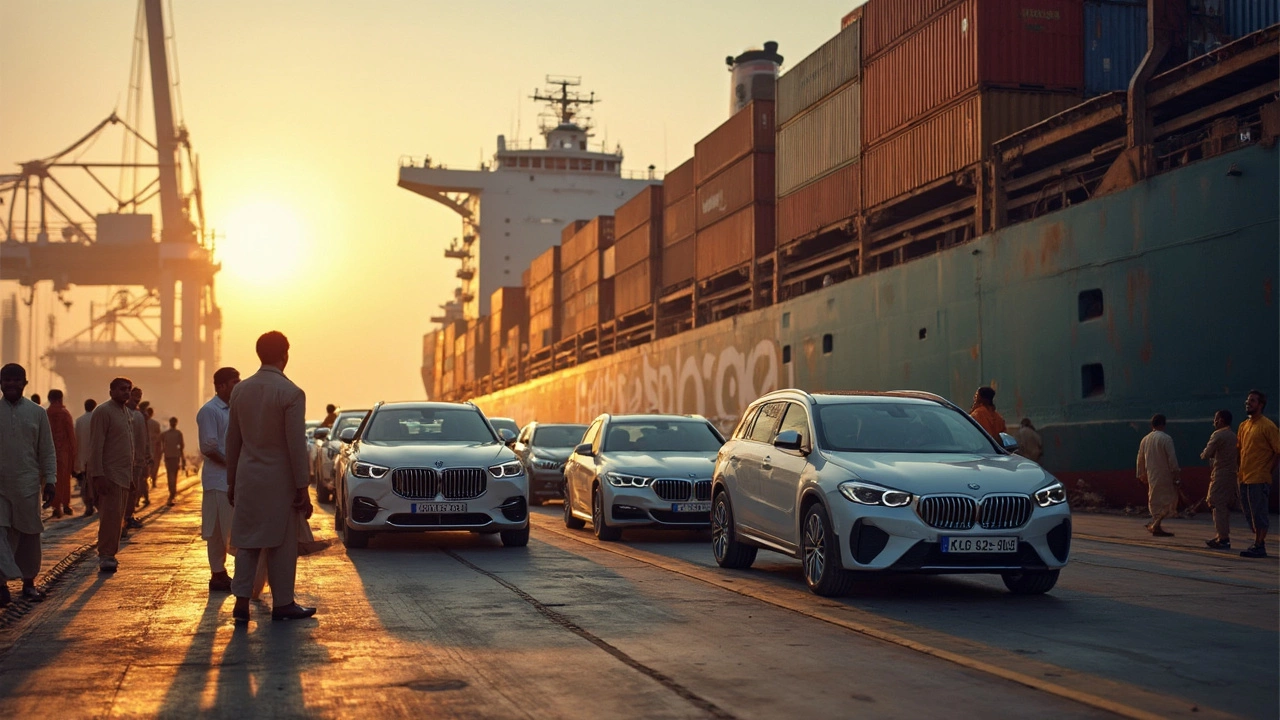 Apr, 2 2025
Apr, 2 2025
Thinking about importing a car to India? You're not alone. While the allure of driving a unique model not available locally is strong, is it really cheaper? Before diving into this, it's good to understand some key factors that could change the cost dynamics significantly.
First off, importing isn't just about buying the car overseas and shipping it over. There's a web of duties and taxes you'll have to navigate. Import duty alone can be quite hefty, often reaching up to 125% of the car's value. And we haven't even touched on GST, which hits hard at around 28-50%. Yep, it's a lot more than you'd bargain for at first glance.
Then come the hidden costs—those pesky extras like port handling, insurance for shipping, and registration fees. These can add up quickly and are often underestimated by eager importers. So while the initial price tag of the car might sound like a bargain, these additional expenses can make your wallet much lighter than planned.
- Understanding Import Duties and Taxes
- Unveiling Hidden Costs
- Comparing to Local Purchases
- Tips for a Smooth Import Process
Understanding Import Duties and Taxes
So, you've got your eyes on a slick ride from overseas, but before you jump the gun, let's talk about the financial terrain—specifically, the dreaded import duties and taxes that await your prized possession at the Indian border.
India imposes a bunch of charges on imported cars. The first and most significant is the import duty, which can vary but often lands between 60% to 100% of the car's cost, insurance, and freight (CIF) value. But wait, there's more! Once the import duty is sorted, you'll face the additional cess on luxury cars which can add another 12-29% based on the vehicle's engine capacity and price.
Here's a quick glance at what costs might look like:
| Type of Charge | Estimated Cost |
|---|---|
| Import Duty | 60% - 100% of CIF value |
| Integrated GST (IGST) | 18% - 28% of CIF value + Duty |
| Social Welfare Surcharge | 10% on Duty |
| Total Duty & Tax | Up to 125% of CIF |
Adding to this, India charges GST (Goods and Services Tax) for imported vehicles, effective at the point of customs. The GST rate sits between 18% to 28%, depending on the car category. And if your car is a luxury model, expect a further horror story with up to 50% taxes due to the cumulative effect of various levies.
All these charges can escalate quickly, often doubling the base price of your vehicle. So, before making any decisions, it's wise to calculate and factor in these fees to assess whether or not importing is the right move for your budget.
Unveiling Hidden Costs
So, you're set on importing a car to India? Awesome, but before you dive in headfirst, let’s talk about those sneaky hidden costs. These are the charges that might not be on your radar initially, but they can sure take a bite out of your budget.
First up, there's the shipping insurance. While it might seem like just another expense, it's one you really don't want to skip. After all, your car’s crossing oceans and multiple ports; you'll want it insured against damage or theft.
Another biggie is port handling charges. Once your car hits Indian shores, there are costs associated with unloading it from the ship, storing it temporarily, and transferring it out of the port. These fees can vary depending on the port, so it’s wise to ask about them upfront.
Then, there are demurrage charges. These are the fees incurred if your car overstays its welcome at the port beyond the free period. Due to delays in customs or other paperwork hiccups, these charges can quickly snowball.
Let's not forget the registration fees. Once your car is in India, you’ve got to get it registered. Depending on the car’s make and model, these fees can add a few more zeros to your tab.
Considering these extras, what started as a bargain in terms of purchase price can start to look quite different. Here's a quick snapshot of some potential hidden costs:
| Expense | Cost Range (INR) |
|---|---|
| Shipping Insurance | 10,000 - 30,000 |
| Port Handling Charges | 20,000 - 50,000 |
| Demurrage Fees | Varies greatly |
| Registration Fees | 20,000 - 1,00,000 |
These costs emphasize why it's so vital to calculate everything and leave a little wiggle room in your budget. Preparing for these extras can help ensure your car import journey doesn't stall halfway.

Comparing to Local Purchases
When sizing up the idea of importing cars to India vs. buying locally, you're talking about two different beasts altogether. Sure, snagging an overseas beauty might seem cooler, but let's weigh the pros and cons first.
Buying a car locally has its perks, mainly because what you see is what you pay. There's no surprise at the cash register. Taxes are generally included in the sticker price and you get to skip the red tape that comes with importing. Plus, warranty and servicing are much simpler when dealing with local dealerships, which can save you both time and money in the long run.
On the other hand, if you've got your heart set on a specific model not available in India, importing could seem like the way to go. But beware of the costs—by the time you've tacked on import duties, GST, shipping, and registration fees, the dream car might stretch your budget further than anticipated.
Let's break down an example to make it more real. Say you're eyeing a car priced around $20,000 in the international market. Factor in the import duties and you're looking at an additional 125% on top. Then add GST which could be around 28-50%, and all of a sudden, that initial price tag balloons. You get a flashy car, sure, but at almost double the price!
| Cost Component | Local Purchase | Import Purchase |
|---|---|---|
| Car Price | Price Included | $20,000 |
| Import Duty | NA | $25,000 |
| GST | Included | $5,600 - $10,000 |
| Total Cost | All Inclusive Pricing | $50,600 - $55,000 |
So, while the idea of importing has its allure, crunch the numbers. Often, local purchase yields less headache and a more predictable expense.
Tips for a Smooth Import Process
Successfully importing a car to India isn't just about finding a great deal overseas. It's also about navigating the maze of import regulations and logistics sensibly. To ensure your car's journey to India is as smooth as possible, keep these tips in mind.
Start by doing your homework on the specific import duties and taxes that apply to your car's make and model. Check the Central Board of Indirect Taxes and Customs (CBIC) website for the most up-to-date rates. Knowing the exact fees can save you from unexpected shocks when your car arrives.
Documentation is key. Ensure you have all the necessary paperwork ready, such as the purchase invoice, vehicle identification number (VIN), and certification under the emissions standards. Indian authorities are particularly strict about emissions, so if your car doesn't comply with Bharat Stage VI norms, you might find yourself in a jam.
Consider hiring a professional customs broker or a logistics company that specializes in importing cars to India. Their expertise can be invaluable in avoiding pitfalls and ensuring all regulations are followed correctly. They'll handle things like customs clearance and registration paperwork, making the process less of a headache for you.
Shipping insurance is another critical element. Mishaps can happen during transit, and having comprehensive coverage ensures that you're financially protected if your car is damaged or lost.
- Select the Right Shipping Method: Decide between Roll-on, Roll-off (RoRo) and container shipping. RoRo is generally cheaper but less secure, while container shipping offers more protection.
- Calculate Total Costs in Advance: Apart from the car price, consider costs like shipping, insurance, import duties, and post-arrival expenses like registration and customs duties.
- Plan for Local Expenses: Once your car is in India, remember the local registration and road tax, which will add to your overall spending.
By paying attention to these details and planning ahead, you can navigate the complexities of car importation without unnecessary hassles. It might not be the cheapest affair, especially with car customs in play, but by being informed, you can make the process as efficient and stress-free as possible.